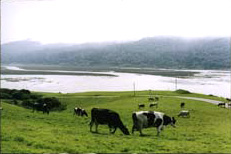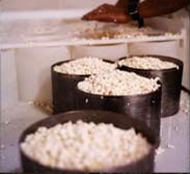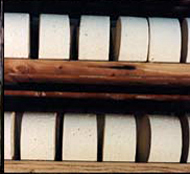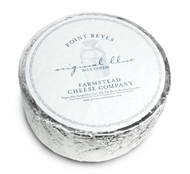 |

 |
| Aging wheels of Point Reyes Original Blue Cheese.
Photo courtesy of Point Reyes Farmstead Cheese Company. |
| WHAT IT IS: A creamy, melt-in-your-mouth farmstead blue cheese from Marin County, California. |
| WHY IT’S DIFFERENT: An exceptional-quality cheese that has full, rich blue flavor without any of the sharpness that drives some people away from blue cheeses. |
| WHY WE LOVE IT: It dazzles the palate, whether in savory company with other cheeses, nuts and olives, or as a sweet dessert with peaches, pears and a glass of Sauternes or Port. |
| PURCHASE AT: PointReyesCheese.com |
|
|
 |

Point Reyes Original Blue:
Page 2: Cheese Making Secrets
This is Page 2 of a seven-page review. Click on the black links below to visit other pages.
INDEX OF REVIEW
MORE TO DISCOVER
|
Making Blue Cheese: The Secrets Of Success
Many products have a “secret recipe”: Original Blue’s is guarded by Master Cheesemaker Monte McIntyre, a relocated Iowan who has been making blue cheese for more than 15 years. The secret to Original Blue lies not only in a recipe, but in a combination of geography and other factors that produce a unique end product:
- The Grade A raw milk† comes from a closed herd of 250 Holstein cows that graze in the hilly green pastures
 overlooking Tomales Bay, a long, narrow finger of water created by a peninsula that separates the Pacific Ocean from the mainland. Since Original Blue is a farmstead cheese, this imparts the distinct taste of “terroir”‡: the cows’ milk reflects the flavor of the terrain. Animals from the same herd moved ten miles away to graze would produce a different-flavored cheese. overlooking Tomales Bay, a long, narrow finger of water created by a peninsula that separates the Pacific Ocean from the mainland. Since Original Blue is a farmstead cheese, this imparts the distinct taste of “terroir”‡: the cows’ milk reflects the flavor of the terrain. Animals from the same herd moved ten miles away to graze would produce a different-flavored cheese.
†Raw (unpasteurized) milk retains more flavor, but by law must be aged 60 days or more to kill any harmful bacteria that might be present in the unpasteurized milk.
‡Terroir, pronounced ter-WAH, is the French word for soil, land or terrain. The term is used to convey the larger concept of “a sense of place,” its specific soil, geology, aspect, altitude and microclimate—the sum of the effects of the environment on the creation of what is grown there.
- The coastal fog and the salty Pacific breezes that drift in from the bay impact the vegetation that is eaten by the herd, as well as help cure and age the cheeses.
- Time is a human-added factor that influences the outcome: cheesemaking begins within two or three hours of milking. The cheese is made from the freshest possible milk.
The milking starts each day at 2 a.m. and then the cheesemaking begins. Starter cultures, kosher salt, Penicillium roqueforti (the mold that creates the blue veining) and rennet (the coagulating enzyme that creates curds) are then mixed into the milk. After the curds separate from the whey, the whey is drained off and the curds are “hooped” into forms to create individual 6-1/2 pound wheels. The cheese is all natural: the milk is hormone-free, contains no preservatives, bleaches or whiteners, and is made with microbial rennet. (The cheese is also certified kosher and gluten free.)
 |
 |
 |
Fresh curds, “hooped” into forms, look like relatives of large curds of cottage cheese. They will coalesce into solid wheels. |
The 6-1/2 pound wheels age on racks for 5 to 6 months. During this long aging period the creamy texture and full flavors develop. |
Six-month-old cheese is ready for sale. |
Continue To Page 3: Serving Suggestions
Go To The Article Index Above
FOR ADDITIONAL INFORMATION, special offers,
contests, opinion surveys, THE NIBBLE
back issues archive, product gift-finder, links to our favorite
food websites, and the ability to nominate YOUR favorite nibbles,
visit the home page of TheNibble.com.
Do you have friends who would enjoy THE NIBBLE?
Click here to send them an invitation to sign up for their own copy. |
ABOUT THE NIBBLE. THE NIBBLE™, Great Food Finds™, is an online magazine about specialty foods and the gourmet life. It is the only consumer publication and website that focuses on reviewing the best specialty foods and beverages, in every category. The magazine also covers tabletop items, gourmet housewares, and other areas of interest to people who love fine food.
© Copyright 2004-2026 Lifestyle Direct, Inc. All rights
reserved. All information contained herein is subject to change at any time
without notice. All details must be directly confirmed with manufacturers, service
establishments and other third parties. The material in this newsletter may not
be reproduced, distributed, transmitted, cached, or otherwise used, except with
the prior written permission of Lifestyle Direct, Inc.
|
 |
|
 |




 overlooking Tomales Bay, a long, narrow finger of water created by a peninsula that separates the Pacific Ocean from the mainland. Since Original Blue is a farmstead cheese, this imparts the distinct taste of “terroir”‡: the cows’ milk reflects the flavor of the terrain. Animals from the same herd moved ten miles away to graze would produce a different-flavored cheese.
overlooking Tomales Bay, a long, narrow finger of water created by a peninsula that separates the Pacific Ocean from the mainland. Since Original Blue is a farmstead cheese, this imparts the distinct taste of “terroir”‡: the cows’ milk reflects the flavor of the terrain. Animals from the same herd moved ten miles away to graze would produce a different-flavored cheese.

